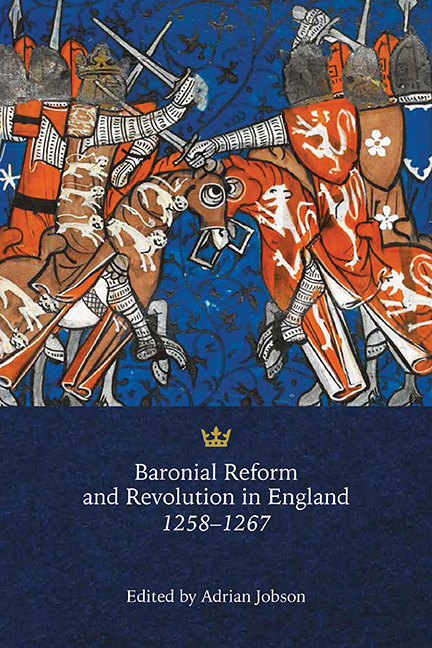Book contents
- Frontmatter
- Dedication
- Contents
- List of Illustrations
- Acknowledgements
- List of Abbreviations
- Introduction
- Modern Historians and the Period of Reform and Rebellion, 1258–1265
- The Secret Revolution of 1258
- Baronial Reform, the Justiciar’s Court and Commercial Legislation: The Case of Grimsby
- Crisis Management: Baronial Reform at the Exchequer
- Local Administration during the Period of Reform and Rebellion
- What Happened in 1261?
- Writing Reform and Rebellion
- Civic Government in Troubled Times: London c.1263–1270
- The Montfortian Bishops
- Reformers and Royalists: Aristocratic Women in Politics, 1258–1267
- The Midlands Knights and the Barons’ War: The Warwickshire Evidence
- Retinues, Agents and Garrisons during the Barons’ Wars
- The Barons’ War in the North of England, 1264–1265
- The Maritime Theatre, 1258–1267
- Reasserting Medieval Kingship: King Henry III and the Dictum of Kenilworth
- Index
Baronial Reform, the Justiciar’s Court and Commercial Legislation: The Case of Grimsby
Published online by Cambridge University Press: 21 May 2021
- Frontmatter
- Dedication
- Contents
- List of Illustrations
- Acknowledgements
- List of Abbreviations
- Introduction
- Modern Historians and the Period of Reform and Rebellion, 1258–1265
- The Secret Revolution of 1258
- Baronial Reform, the Justiciar’s Court and Commercial Legislation: The Case of Grimsby
- Crisis Management: Baronial Reform at the Exchequer
- Local Administration during the Period of Reform and Rebellion
- What Happened in 1261?
- Writing Reform and Rebellion
- Civic Government in Troubled Times: London c.1263–1270
- The Montfortian Bishops
- Reformers and Royalists: Aristocratic Women in Politics, 1258–1267
- The Midlands Knights and the Barons’ War: The Warwickshire Evidence
- Retinues, Agents and Garrisons during the Barons’ Wars
- The Barons’ War in the North of England, 1264–1265
- The Maritime Theatre, 1258–1267
- Reasserting Medieval Kingship: King Henry III and the Dictum of Kenilworth
- Index
Summary
Though the reform movement was guided by a group of leading magnates, amongst them Simon de Montfort, earl of Leicester, Roger Bigod, earl of Norfolk and Richard de Clare, earl of Gloucester, it was never the case that efforts at reform gave primacy solely to aristocratic concerns. There is clear evidence that throughout the course of the movement the reform-minded barons had the interests of a wider political and social spectrum in mind. The proclamations, enactments and legislation issued by the reformers show an awareness of, and concern for, others beside themselves, to include the county knights, freemen and, though not widely examined but of particular focus here, merchants. Members of the peasantry were also drawn to the reform cause by virtue of the appeal of the reformers’ goals. Though the momentum of the movement began to falter and Henry III began to resume greater royal authority in the course of 1261 (only to lose it again in 1263 before eventually manoeuvring his opponents into arbitration over the future of the movement in 1264), the reformers did not forsake issues of concern to merchants and townsmen. In 1264, as part of the schedule of grievances submitted to the chief arbitrator, Louis IX of France, the reform barons listed as one of their eight points of grievance a clause designed to safeguard the independence of merchants, ensure the free flow of trade and prevent the excessive taking of prises by the king and his courtiers. Historians, however, have not fully recognised the degree of interaction between the justiciar's court, as presided over by the baronially appointed justiciar, Hugh Bigod, and the drafting of commercial legislation.
The single charter roll entry for 3 November 1258 lists fifteen provisions for the regulation of commerce within Grimsby and is well-known to scholars of Lincolnshire history, illustrating as it does the town's vibrant economy centred on fish and foreign trade. In addition, those scholars interested in the broader issue of the development of borough customs have also been drawn to the same enrolment. The entry, which is neither a charter nor an inspeximus of one, has also been examined briefly by historians interested in the interaction between the common law and the somewhat murkier operation of the lex mercatoria .
- Type
- Chapter
- Information
- Baronial Reform and Revolution in England, 1258-1267 , pp. 43 - 55Publisher: Boydell & BrewerPrint publication year: 2016



